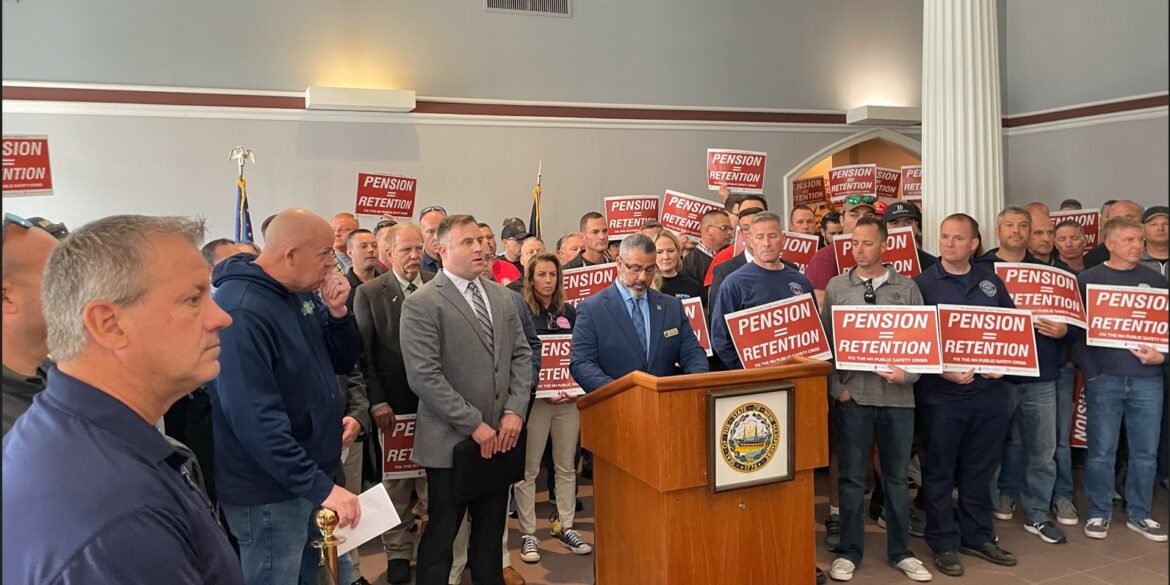By PAULA TRACY, InDepthNH.org
CONCORD – Public safety is on the line in the state budget right now, with the possibility that the state could lose seasoned police officers and firefighters to the private sector and out-of-state agencies if the state does not adequately fund the retirement system, members warned.
Hundreds of police and fire personnel from across the state attended a press conference at the Legislative Office Building Tuesday in support of the House version of the budget for the next two years which contains $50 million to address the matter.
The issue impacts about 1,800 employees who pay into the retirement system but not into Social Security.
While it enjoyed support in the House and is in the current version of its budget, it may be facing an uphill battle in the Senate and with Gov. Chris Sununu.
If not addressed, union leaders said public safety might be stretched beyond its current situation with high vacancy rates, a lack of new recruits, and early retirements.
Last week, Sununu indicated he does not support the changes to the retirement system.
“I’m not looking to make any changes,” Sununu said last Wednesday when he met with reporters.
“We’ve made huge strides in changing and addressing some of the problems in the pension system, backfilling the holes and all of that. My concern is that these changes would effectively undo a lot of the positive progress that was made a long time ago to build back,” and address the insolvency, Sununu said.
He said he had just been to Connecticut which has a huge problem with its pension system and is “scared to death about what that means when you let these unfunded liabilities go unchecked and unattended.”
“We’ve made huge strides and changes from the COLA (cost of living adjustment) issue, the massive changes we made last year that cost us tens of millions of dollars,” he said.
Senate President Jeb Bradley, R-Wolfeboro, has also expressed similar concern.
The matter is now in the Senate’s hands as part of the budget.
It was first a piece of legislation, House Bill 436,https://www.gencourt.state.nh.us/bill_status/billinfo.aspx?id=719&inflect=2
There are two funding options available to the state to fill the gap. One could be a one-time upfront payment of $134 million which would cost the state less over time than the current proposal.
Speakers said many are watching and waiting to see what happens with this budget and if it doesn’t pass the predicted a “mass exodus.”
The state can get behind and close the door on discussions about changes that occurred when changes were made to the retirement system in 2011, speakers said.
This impacts “Group II” members only, those hired prior to July 1, 2011 but had not reached a vested status in the pension at the time of the changes.
The measure would restore the years of service multiplier from 2.1 to 2.4 percent back to 2.5 percent for every year of creditable service.
It restores average final compensation to be calculated on the members’ best 3-year average rather than the current 5-year average; restores the inclusion of overtime and special duty pay and retirement age from 45 rather than 50 years.
In addition to Mike Geha, president of NH Police Association speaking, Frank Campo of the New Hampshire Troopers Association, Brian Ryll, of the Professional Firefighters of New Hampshire, Salem Fire Chief Lawrence Best, and Manchester Police Chief Al Aldenberg also spoke.
Campo, said there are currently 69 total vacancies in State Police or 20 percent.
He said it is at a “critical juncture” where current retirement benefits are challenging troopers to consider other lines of work. He said the state retirement system is less competitive than other New England states.
Ryll, who is captain of the Portsmouth Fire Department, said their inability to retain personnel has produced a disastrous outlook.
The “noble calling” is being challenged because of private sector offerings and comparatively better out-of-state firefighting jobs, he said.
“They simply want the benefit they had,” he said. “HB 2, the House proposed budget restores 85 percent,” he said.
Best, who heads up the Fire Chiefs, said they are concerned about the retention of the Group II class, many of whom are now in leadership positions and are crucial to continued safe operations.
“Replacing is a far bigger challenge than it once was,” Best said.
Aldenberg said now is the time to address the changes made over 10 years ago. Retention is key.
“We must act now. Now is the time to retain and value,” Aldenberg said. “They are simply asking what was promised them when they began paying into the retirement system.”





